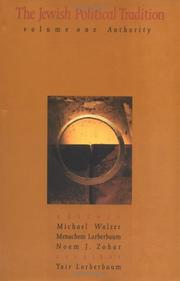| Listing 1 - 3 of 3 |
Sort by
|
Book
ISBN: 1316191303 1316211657 1316189465 1316209776 1316206092 1316204308 1316207935 1107477948 1107063272 1107636140 9781316204306 9781107063273 Year: 2014 Publisher: New York
Abstract | Keywords | Export | Availability | Bookmark
 Loading...
Loading...Choose an application
- Reference Manager
- EndNote
- RefWorks (Direct export to RefWorks)
The idea of creation in the divine image has a long and complex history. While its roots apparently lie in the royal myths of Mesopotamia and Egypt, this book argues that it was the biblical account of creation presented in the first chapters of Genesis and its interpretation in early rabbinic literature that created the basis for the perennial inquiry of the concept in the Judeo-Christian tradition. Yair Lorberbaum reconstructs the idea of the creation of man in the image of God (tselem Elohim) attributed in the Midrash and the Talmud. He analyzes meanings attributed to tselem Elohim in early rabbinic thought, as expressed in Aggadah, and explores its application in the normative, legal, and ritual realms.
Image of God in rabbinical literature. --- Theological anthropology --- Jewish law. --- Aggada. --- Agada (Talmud) --- Agadah (Talmud) --- Aggadah (Talmud) --- Hagadah (Talmud) --- Haggada (Talmud) --- Haggadah (Talmud) --- Jewish legends --- Rabbinical literature --- Biblical law --- Civil law (Jewish law) --- Halacha --- Halakha --- Halakhah --- Hebrew law --- Jews --- Law, Hebrew --- Law, Jewish --- Law, Mosaic --- Law in the Bible --- Mosaic law --- Torah law --- Law, Semitic --- Commandments (Judaism) --- Man (Jewish theology) --- Judaism. --- Law
Multi
ISBN: 9781107477940 9781107063273 9781107636149 Year: 2015 Publisher: Cambridge Cambridge University Press
Abstract | Keywords | Export | Availability | Bookmark
 Loading...
Loading...Choose an application
- Reference Manager
- EndNote
- RefWorks (Direct export to RefWorks)

ISBN: 9786611729646 1281729647 0300127723 9780300127720 0300102011 9780300102017 0300078226 9780300078220 661172964X 9781281729644 Year: 2000 Publisher: New Haven Yale University Press
Abstract | Keywords | Export | Availability | Bookmark
 Loading...
Loading...Choose an application
- Reference Manager
- EndNote
- RefWorks (Direct export to RefWorks)
This book launches a landmark four-volume collaborative work exploring the political thought of the Jewish people from biblical times to the present. Each volume includes a selection of texts-from the Bible and Talmud, midrashic literature, legal responsa, treatises, and pamphlets-annotated for modern readers and accompanied by new commentaries written by eminent philosophers, lawyers, political theorists, and other scholars working in different fields of Jewish studies. These contributors join the arguments of the texts, agreeing or disagreeing, elaborating, refining, qualifying, and sometimes repudiating the political views of the original authors. The series brings the little-known and unexplored Jewish tradition of political thinking and writing into the light, showing where and how it resonates in the state of Israel, the chief diaspora settlements, and, more broadly, modern political experience. This first volume, Authority, addresses the basic question of who ought to rule the community: What claims to rule have been put forward from the time of the exodus from Egypt to the establishment of the state of Israel? How are such claims disputed and defended? What constitutes legitimate authority? The authors discuss the authority of God, then the claims of kings, priests, prophets, rabbis, lay leaders, gentile rulers (during the years of the exile), and the Israeli state. The volume concludes with several perspectives on the issue of whether a modern state can be both Jewish and democratic. Forthcoming volumes will address the themes of membership, community, and political vision. Among the contributors to this volume: Amy Gutmann Moshe Halbertal David Hartman Moshe Idel Sanford Levinson Susan Neiman Hilary Putnam Joseph Raz Michael Sandel Allan Silver Yael Tamir
Jews --- Judaism and politics. --- Judaism and state. --- Leadership --- State and Judaism --- State, The --- Judaism --- Politics and Judaism --- Political science --- Zionism --- Politics and government. --- Religious aspects --- Judaism. --- Political aspects --- Political and social conditions
| Listing 1 - 3 of 3 |
Sort by
|

 Search
Search Feedback
Feedback About UniCat
About UniCat  Help
Help News
News